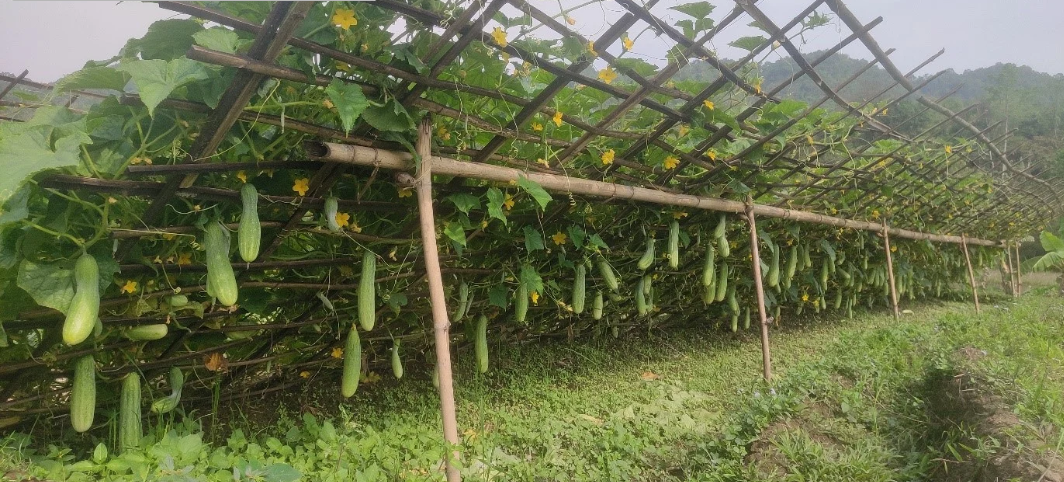Rural Agro Farms (RAF) LLP has been awarded a government permit to establish and operate a comprehensive agricultural mandi in Nagaland under the Build-Operate-Maintain Public-Private Partnership (BOM-PPP) model. Spanning 10 acres, the mandi will feature dedicated sections for Anaj (grain) and Sabji (vegetable) markets, aimed at enhancing agricultural trade, providing modern amenities, and bolstering the agrarian economy of Nagaland.
The Union Minister of State for Social Justice & Empowerment, Ramdas Athawale laid the foundation stone for Naga Mandi Project at Seithekema – A, near EAC headquarter, Chumoukedima on 6th September 2024, in the presence of Chief Minister, Neiphiu Rio, MLA & Advisor, Mhathung Yanthan, and other officials.
Speaking on the occasion, the Union Minister said he believes that people of Nagaland will also come forward for the success of this project. He mentioned that, without agriculture there is no meaning to our life, and that agriculture is the best brand that gives opportunity for revenue generation and expressed hoped that farmers will greatly benefit from this project and boost the economy of the State.
Project Scope and Objectives:
The Naga Mandi will serve as a vital hub for the wholesale purchase and sale of various agricultural commodities produced in the region. The primary objectives include: Establishing a fair and transparent marketplace for farmers to sell their produce at competitive prices; Enhancing market access and minimising post-harvest losses through efficient procurement, storage, and distribution systems; Stimulating economic growth in Nagaland by strengthening the agriculture sector and contributing to the state’s GDP.
PPP Model Overview:
The project will be executed through a Public-Private Partnership, combining the strengths of both sectors. RAF will collaborate with the Government of Nagaland to develop, operate, and maintain the mandi infrastructure, ensuring efficient resource allocation, risk-sharing, and best utilisation of expertise.
Regulatory Framework:
Operations will comply with the Nagaland Agriculture Produce Marketing Act 2005. RAF will work closely with government authorities to ensure adherence to all relevant laws and regulations, fostering a conducive business environment.
Key Features of the Mandi:
The mandi will be equipped with state-of-the-art infrastructure, including: Market yards for showcasing and trading agricultural produce. Cold storage facilities for preserving perishable goods. Grading and sorting units to maintain quality standards. Auction halls for transparent price discovery. Administrative offices for managing operations and facilitating transactions.
Financial Viability:
A thorough financial analysis has been done to evaluate the project’s viability, considering revenue streams, cost projections, funding sources, and revenue-sharing mechanisms between public and private partners to ensure long-term sustainability and profitability.
Infrastructure Features:
Shops: 110 retail outlets for traders.
Warehouses: 10 units with a total capacity of 4,000 MT.
Auction Yards: 2 dedicated areas for transparent trading.
Cold Storage: 2 units with a capacity of 500 MT each.
Kisan Bhavan: AC and non-AC rooms for farmers visiting the mandi.
Project Benefits:
The Naga Mandi is projected to generate significant economic benefits,
– Enhanced local economic growth and farmer income.
– Creation of direct and indirect job opportunities.
– Improved market efficiency and agricultural development.
– Enhanced quality control and farmer empowerment.
– Optimised supply chains and community development.
– Increased access to financing and market intelligence.
The establishment of the Naga Mandi by RAF LLP under the BOM-PPP model represented a significant opportunity for revenue generation while contributing to the agricultural and economic development of Nagaland. The comprehensive facilities will support efficient market operations, benefiting all stakeholders in the agricultural supply chain, and fostering a sustainable and inclusive growth environment for the local community.


